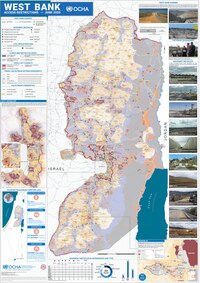Zionism as settler colonialism
This perspective contends that Zionism involves processes of elimination and assimilation of Palestinians, akin to other settler colonial contexts similar to the creation of the United States and Australia.
[2][3][4] Settler colonialism operates by processes including physical elimination of native inhabitants but also can encompass projects of assimilation, segregation, miscegenation, religious conversion, and incarceration.
[19][20][page needed] In 1905, some Jewish immigrants to the region promoted the idea of Hebrew labor, arguing that all Jewish-owned businesses should only employ Jews, to displace Arab workforce hired by the First Aliyah.
[23][24] Although considered by some Israelis to be a "brutal twist of fate, unexpected, undesired, unconsidered by the early [Zionist] pioneers", some historians have described the Nakba as a campaign of ethnic cleansing.
[28] Proponents of the paradigm of Zionism as settler colonialism include Edward Said, Rashid Khalidi, Noam Chomsky, Ilan Pappé, Fayez Sayegh, Maxime Rodinson, George Jabbour [ar], Ibrahim Abu-Lughod, Baha Abu-Laban, Jamil Hilal [ar], Rosemary Sayigh, Amal Jamal and Ismail Raji al-Faruqi.
[16] Sociologist Rachel Busbridge contends that the subsequent popularity of the idea of Zionism as settler colonialism is inseparable from frustration at the stagnation of the two-state process and resulting Western left-wing sympathy for Palestinian nationalism.
[38][39][clarification needed] The portrayal of Zionism as settler colonialism is strongly rejected by most Zionists and Israeli Jews, and is perceived either as an attack on the legitimacy of Israel, a form of antisemitism, or historically inaccurate.
[40][41][36] International law professor Yuval Shany has stated that labelling Israel's establishment as a colonial enterprise is "a significant category error".
[43] Historian Benny Morris suggests that Zionism does not meet the definition of colonialism since it did not involve "an imperial power acquiring political control over another country, settling it with its sons, and exploiting it economically".
[45] Historian Nur Masalha says, "The Palestinians share common experiences with other indigenous peoples who have had their narrative denied, their material culture destroyed and their histories erased or reinvented by European white settlers and colonisers.
[45][42][47] According to The Economist, the Palestinian diaspora has sought to reframe the Israeli-Palestinian conflict from "a clash between two national movements" to "a generational liberation struggle against 'settler colonialism'".
As examples of settler colonial phenomena they include "aerial and maritime bombardment, massacre and invasion, home demolitions, land theft, identity card confiscation, racist laws and loyalty tests, the wall, the siege on Gaza, cultural appropriation, dependence on willing (or unwilling) native collaboration regarding security arrangements".
[60] John Collins states that studies have "definitively established" that "the architects of Zionism were conscious and often unapologetic about their status as colonizers whose right to the land superseded that of Palestine's Arab inhabitants".
[66] Rachel Busbridge argues that settler colonialism is "a coherent and legible frame" and "a far more accurate portrayal of the conflict than the picture of Palestinian criminality and Israeli victimhood that has conventionally been painted".
[68] Anthropologist Anne de Jong says that early Zionists promoted a narrative of binary conflict between two competing groups with equally valid claims in order to deflect criticisms of settler colonialism.
[70] Historian Rashid Khalidi argues that all other settler-colonial wars in the twentieth century ended in defeat for colonists, making Palestine an exception: "Israel has been extremely successful in forcibly establishing itself as a colonial reality in a post-colonial age".
It also analyses the dispossession of indigenous people and population transfer, including sociological, historical and postcolonial studies into an examination of the Zionist project in Palestine.
[57] Sociologist Areej Sabbagh-Khoury suggests that "in tracing the settler colonial paradigm ... Israeli critical sociology, albeit groundbreaking, has suffered from a myopia engendered through hegemony.

